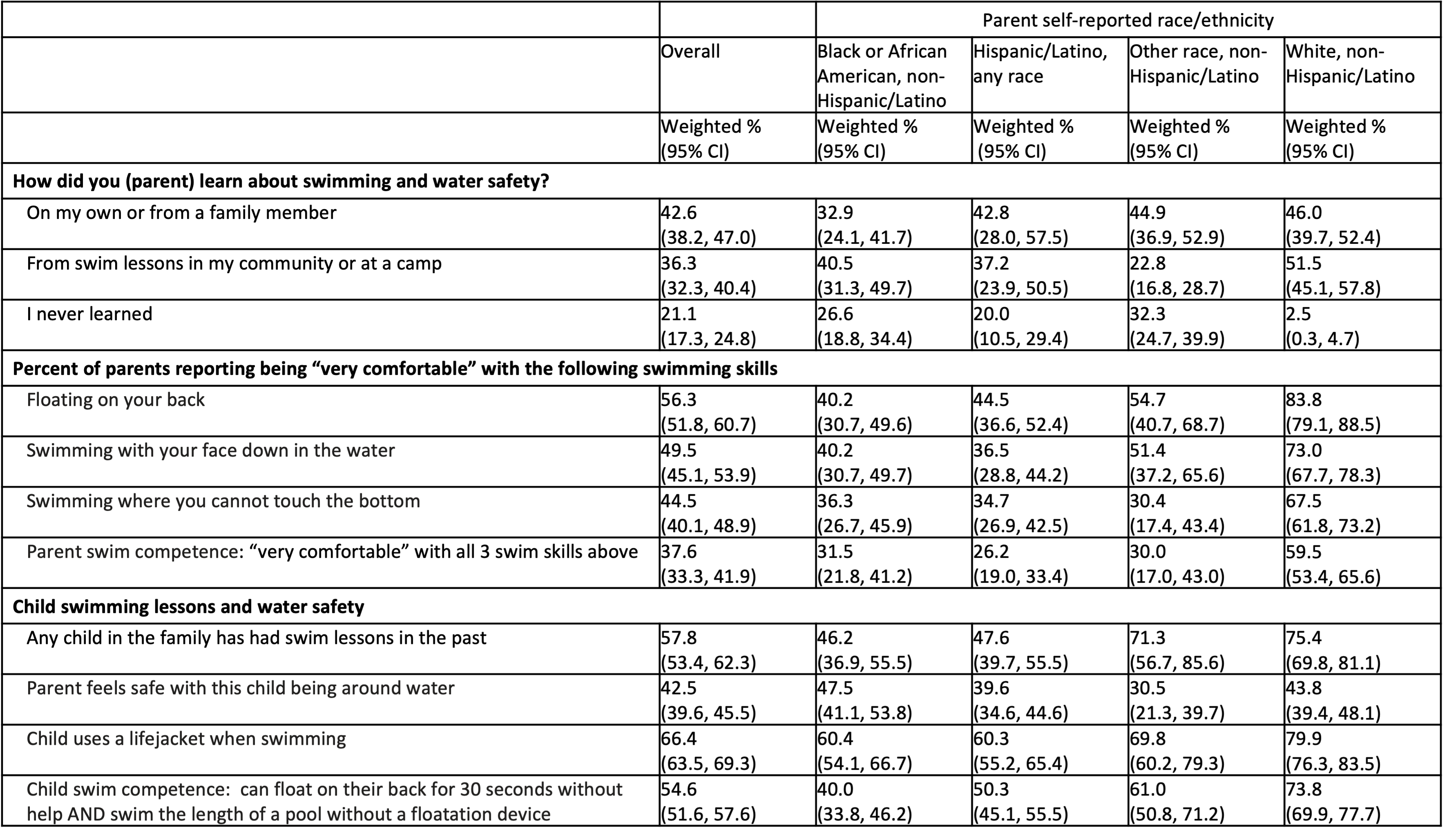Injury Prevention
Category: Abstract Submission
Injury Prevention I
129 - Variation in Swim Lessons and Water Safety Skills in Chicago: Intergenerational Legacy, Structural Barriers, or Both?
Sunday, April 24, 2022
3:30 PM - 6:00 PM US MT
Poster Number: 129
Publication Number: 129.329
Publication Number: 129.329
Neshwa Rajeh, Ann & Robert H. Lurie Children's Hospital of Chicago, Chicago, IL, United States; Anne Bendelow, Ann & Robert H. Lurie Children's Hospital of Chicago, Chicago, IL, United States; Marie E. Heffernan, Ann & Robert H. Lurie Children's Hospital of Chicago, Chicago, IL, United States; Amy Hill, Ann & Robert H. Lurie Children's Hospital of Chicago, Chicago, IL, United States; Matthew M. Davis, Ann & Robert H. Lurie Children's Hospital of Chicago, Chicago, IL, United States; Michelle L. Macy, Ann & Robert H. Lurie Children's Hospital of Chicago, Chicago, IL, United States

Michelle Macy, MD, MS (she/her/hers)
Associate Professor
Ann & Robert H. Lurie Children's Hospital of Chicago
Chicago, Illinois, United States
Presenting Author(s)
Background: Economic, gender, and racial/ethnic segregation in the U.S. has resulted in unequal access to pools, open water, and opportunities to learn to swim. Children, males, individuals from minoritized racial/ethnic groups and of lower socioeconomic status have fewer swimming skills and higher risk of drowning. However, little is known about intergenerational swim experiences in families from diverse racial/ethnic and socioeconomic backgrounds.
Objective: To examine racial/ethnic, socioeconomic, and geographic differences in learning to swim and water safety skills among parents and their children in Chicago.
Design/Methods: Data were collected through the Voices of Child Health in Chicago Parent Panel Survey, a longitudinal survey administered tri-annually in English and Spanish via web and phone to parents from all 77 Chicago neighborhoods, in the Nov 2020-Feb 2021 wave with responses from 1505 parents in households with child(ren) < 18. We gathered information about swim lessons and swim skills and created two composite variables of swim competence: 1) parent is very comfortable with 3 swim skills and 2) child can perform 2 water safety skills. We included parents of children < 4 years old, based on the American Academy of Pediatrics’ recommended age to start swim lessons. Child-level chi-square and logistic regression analyses were survey-weighted to be representative of Chicago’s population.
Results: Responses from 1093 parents’ of 1710 children < 4 years old were analyzed (demographics in Table 1). Most parents learned to swim on their own/from family (43%; 95%CI: 38, 47) or in community or camp swim lessons (36%; 95%CI: 32, 40). In contrast, most parents had a child who had taken swim lessons (58%; 95%CI: 53, 62). Statistically significant variations in swim lessons and skills were noted across race/ethnicity groups, with more white parents than parents of other racial/ethnic groups being very comfortable with their own swim skills and reporting their child has water safety skills (Table 2). In adjusted logistic regression, child’s swim competence was positively associated with parent swim competence and a child in the home taking swim lessons (Table 3). Child swim competence was lower among younger parents and Black parents and was not related to family income or geography, without evidence of collinearity.Conclusion(s): Our findings indicate potential intergenerational and sociodemographic impacts on a child’s swim skill acquisition. Future research is needed to explore interest in and access to affordable swim lessons for minoritized groups within the context of structural barriers.
Table 1: Demographics of Study Sample – Chicago Families, 2021.png)
Table 2: Learning to Swim and Swim Skills, by Parent Self-Reported Race/Ethnicity
Objective: To examine racial/ethnic, socioeconomic, and geographic differences in learning to swim and water safety skills among parents and their children in Chicago.
Design/Methods: Data were collected through the Voices of Child Health in Chicago Parent Panel Survey, a longitudinal survey administered tri-annually in English and Spanish via web and phone to parents from all 77 Chicago neighborhoods, in the Nov 2020-Feb 2021 wave with responses from 1505 parents in households with child(ren) < 18. We gathered information about swim lessons and swim skills and created two composite variables of swim competence: 1) parent is very comfortable with 3 swim skills and 2) child can perform 2 water safety skills. We included parents of children < 4 years old, based on the American Academy of Pediatrics’ recommended age to start swim lessons. Child-level chi-square and logistic regression analyses were survey-weighted to be representative of Chicago’s population.
Results: Responses from 1093 parents’ of 1710 children < 4 years old were analyzed (demographics in Table 1). Most parents learned to swim on their own/from family (43%; 95%CI: 38, 47) or in community or camp swim lessons (36%; 95%CI: 32, 40). In contrast, most parents had a child who had taken swim lessons (58%; 95%CI: 53, 62). Statistically significant variations in swim lessons and skills were noted across race/ethnicity groups, with more white parents than parents of other racial/ethnic groups being very comfortable with their own swim skills and reporting their child has water safety skills (Table 2). In adjusted logistic regression, child’s swim competence was positively associated with parent swim competence and a child in the home taking swim lessons (Table 3). Child swim competence was lower among younger parents and Black parents and was not related to family income or geography, without evidence of collinearity.Conclusion(s): Our findings indicate potential intergenerational and sociodemographic impacts on a child’s swim skill acquisition. Future research is needed to explore interest in and access to affordable swim lessons for minoritized groups within the context of structural barriers.
Table 1: Demographics of Study Sample – Chicago Families, 2021
.png)
Table 2: Learning to Swim and Swim Skills, by Parent Self-Reported Race/Ethnicity

